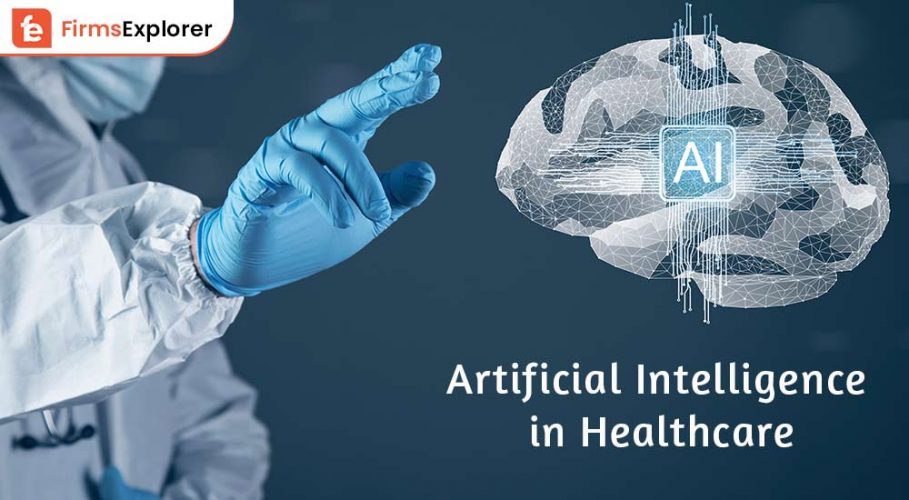
AI is becoming more adept at performing human tasks, but more rapidly, economically, and efficiently. Artificial intelligence is therefore set to revolutionize the healthcare industry as well. So how can the use of AI in healthcare or AI-driven solutions benefit both healthcare providers and patients?
Healthcare practitioners can benefit from artificial intelligence in numerous ways, including innovating current solutions and overcoming obstacles more quickly. As a result, the majority of AI and healthcare technologies are very relevant to the healthcare industry, albeit hospitals and other healthcare organizations may use different strategies.
AI provides many advantages over traditional analytics and health decision-making techniques. For example, as Machine learning algorithms interact with training data, their precision and accuracy can increase, providing people with previously unreachable insights regarding patient outcomes, treatment procedures, and diagnostics. And even while some publications on the application of artificial intelligence in healthcare claim that it can execute specific procedures equally as well as or better than humans, it will be a considerable amount of time before AI in healthcare replaces people for a wide range of medical duties. But many others are still unsure about the importance of artificial intelligence in the healthcare sector. So let’s look at some of the advantages artificial intelligence can have for the healthcare sector with some AI in healthcare examples.
Both robotics and AI have enormous potential in the field of healthcare. Like in our daily lives, our healthcare ecosystem is becoming increasingly reliant on AI and robotics. Here are the top examples of artificial intelligence in healthcare to transform healthcare delivery and medical research.
Although the idea of computer communication is not new, brand-new research is being carried out to combine technology and the human brain directly without the use of keyboards, mice, or monitors. Some patients will benefit greatly from this research. Neurological disorders and nervous system traumas can affect a patient’s ability to move, speak, and interact effectively with others and their surroundings with artificial intelligence in healthcare.
For many who believed they were permanently lost, artificial intelligence-driven brain-computer interfaces (BCIs) can restore those authentic sensations. Along with the 500,000 individuals who suffer spinal injuries each year worldwide, brain-computer integrations have the possibility of significantly improving the quality of life for patients with ALS, strokes, and secured syndrome.
Non-invasive radiological images created by some applications of machine learning and AI in healthcare, such as MRI machines, X-Ray, and CT scanner equipment, can provide a glimpse into the human body. But many diagnostic methods continue to use the real tissue sample from biopsies, which have risks like the potential for infection.
Experts predict that artificial intelligence in healthcare will enable advanced radiological tools to be accurate and extensive enough to replace the need for tissue samples occasionally. If this approach is successful, professionals might be in a better position to choose the best course of treatment since they would have a deeper understanding of how malignancies operate.
Additionally, healthcare professionals may more precisely assess the tumors’ aggressiveness and better target their treatments by the use of AI in healthcare. Artificial intelligence is advancing the cutting-edge field of radionics, which stresses the use of image-based algorithms to determine the genetic and phenotypic features of tumors, allowing “virtual biopsies” and comparable procedures.
In undeveloped nations around the world, access to life-saving medical care can be severely constrained by a lack of qualified medical personnel like radiologists and ultrasound technologists. For example, a dozen hospitals that help compensate Boston’s prestigious Longwood Avenue employ more radiologists than all of West Africa combined. AI in the medical field may indeed be able to mitigate the consequences of this severe shortage of qualified clinical practitioners by transferring the diagnostic activities normally given to humans.
For example, when examining chest x-rays for signs of tuberculosis, AI imaging technologies may attain an accuracy level comparable to people. If this feature could be accomplished thru an application of AI in healthcare readily accessible to healthcare providers in undeveloped places, a qualified diagnostic radiologist would not really necessarily need to be there.
The digital trends in the healthcare industry have been largely facilitated by EHRs, but it has also raised a variety of problems, such as cognitive overload, superfluous documentation, and human stress. Artificial intelligence is now being used by EHR developers to create more user-friendly user interfaces and power some of the repetitive procedures that consume a lot of a user’s time.
Additionally, notifications may be generated with the use of AI in the medical field to fulfill routine mailbox demands like prescription refills. It may also facilitate users’ completion of their to-do lists by assisting in the prioritization of tasks requiring the clinician’s attention.
Antibiotic resistance is becoming a greater threat to communities all over the world as a result of the overuse of these necessary drugs, which promotes the formation of superbugs that are immune to treatments. The hospital environment can become chaotic as a result of multi-drug resistance bacteria, and each year, hundreds of people die as a result.
Before someone becomes unwell, risky individuals can be identified using information from electronic healthcare records that shows patterns of infection. By applying machine learning future techniques and artificial intelligence in healthcare, these analytics can also be improved, and notifications for medical practitioners can be sent out more quickly and accurately.
Pathologists are among the major source of clinical information for health providers across the spectrum of care delivery, as per Jeffrey Golden, MD, Head of the Department Of pathology at BWH & University lecturer of Pathology at HMS.
He asserted that the basis for 70% of all clinical choices is a pathology finding. “About 70 to 75 percent of the total data in an EHR is made up of information derived from a pathology diagnosis. Therefore, the more proficient we become, the more accurate we become, and the faster we locate the correct diagnosis.
It might be possible to do so using digital pathology and artificial intelligence (AI).” Through the use of analytics that can analyze extremely large digital photographs down to the pixel level, providers may indeed be able to identify features that the human visual system might overlook.
Smart technologies are sweeping the consumer market, offering everything from real-time video from within a refrigerator to cars that can detect when a driver is inattentive. Smart devices are also necessary for keeping track of patients in the ICU and other areas in the medical setting. Results could be considerably improved with the use of AI in the health sector.
For example, improving the ability to spot deterioration, detect the onset of sepsis, or sense the appearance of problems may even reduce costs related to hospital-acquired illness consequences. By adding intelligent algorithms to these devices, doctors can have less mental work to complete while still giving patients the greatest care. These are some of the compelling examples of artificial intelligence in healthcare.
Immunotherapy is among the best cancer treatment options. By using the body’s immune system to confront cancer, patients may be able to eradicate tough tumors through the use of AI in healthcare.
Unfortunately, oncologists do not yet have a reliable and accurate method for identifying which patients might benefit from this treatment. Only a small percentage of people respond to the existing immunotherapy alternatives. Algorithms for machine learning and their ability to merge exceedingly complex information may open up new opportunities for customizing medications to a person’s unique genetic profile.
EHRs are filled with patient information, but it has been challenging for app developers and doctors to accurately, promptly, and reliably collect and evaluate that data. Due to issues with data quality and integrity, a jumble of data formats, a mix of both unstructured & structured input variables, and incomplete records, it has proved to be especially difficult to comprehend precisely how to take part in efficient risk analysis, predictive analytics, and diagnostic and therapeutic decision-making support. “Integrating the data into one spot is part of the hard endeavor,” said Ziad Obermeyer, MD, Associate Professor of Medicine at BWH and Assistant Lecturer at HMS.
The problem is different when sickness is forecasted in an EHR, and you must understand what you’re getting. Many useful risk-scoring and stratification tools have been developed as a result of EHR analytics, especially when researchers utilize deep learning techniques to identify unique links between datasets that, at first glance, seem unrelated. To create tools that will actually advance clinical treatment, according to Obermeyer, is crucial to make sure that these procedures do not reinforce inherent biases in the data.
Nearly all consumers today have access to devices with sensors that can actually collect crucial data about their health. Due to this, mobile devices such as smartphones with step trackers and wearables that can continuously monitor a heartbeat are producing an increasing amount of health-related information.
To offer a unique perspective on both individual and community health, this data can be acquired, analyzed, and complemented with patient-provided data via applications as well as other home surveillance systems. Furthermore, applying artificial intelligence to sift through this enormous and varied data treasure trove to find insightful information will be essential.
Professionals expect that images from smartphones and other customer resources will be a key contribution to clinical performance imaging, particularly in underdeveloped regions or developing nations, in keeping with the principle of using mobile technology. Cell phone cameras get better every year, and they can now take images that are of a quality that artificial intelligence algorithms can analyze. The first to benefit from this trend are dermatology and ophthalmology medical specialties.
Even a device that analyses images of a child’s face to find developmental abnormalities was developed by UK researchers. The algorithm is able to identify distinctive traits, such as a child’s jawbone, eye, and nose location, in addition to other characteristics that may indicate a craniofacial anomaly. Additionally, the technology can aid professional judgment by associating widespread images with more than 90 ailments.
As the healthcare sector shifts away from fee-for-service payment structures, reactive care is becoming less common. However, to be upfront about chronic illnesses, pricey acute events, and unanticipated deterioration is a goal shared by all clinicians, and reimbursement systems are now making it possible for them to develop the protocols necessary for proactive, predictive therapy.
Artificial intelligence-powered clinical decision support systems and predictive analytics will provide a significant component of the basis for that development by warning providers of problems long before they would otherwise recognize the need for action. AI frequently needs to thoroughly examine big, complex data sets in order to provide advance warning for diseases like seizures or sepsis.
The use of artificial intelligence (AI) to help clinical decision-making, rate risk, and send out early alerts is one of the most intriguing future avenues for this ground-breaking technique for data analysis. By enabling a fresh era of tools and systems that make clinicians more aware of nuances, more effective at delivering healthcare, and more inclined to get ahead of growing problems, AI will usher in a brand-new era of clinical excellence and revolutionary improvements in patient care.
The biggest issue facing Machine learning and artificial intelligence in healthcare isn’t whether the technology will be effective but how to ensure its adoption in routine clinical practice. Clinicians may eventually gravitate toward jobs that call for only human abilities and the maximum level of mental function. Only those healthcare providers who refuse to collaborate with AI in healthcare may fall short of realizing its full potential.

May 20, 2022
Deprecated: File Theme without comments.php is deprecated since version 3.0.0 with no alternative available. Please include a comments.php template in your theme. in /home/firmsexplorer/public_html/wp-includes/functions.php on line 5613